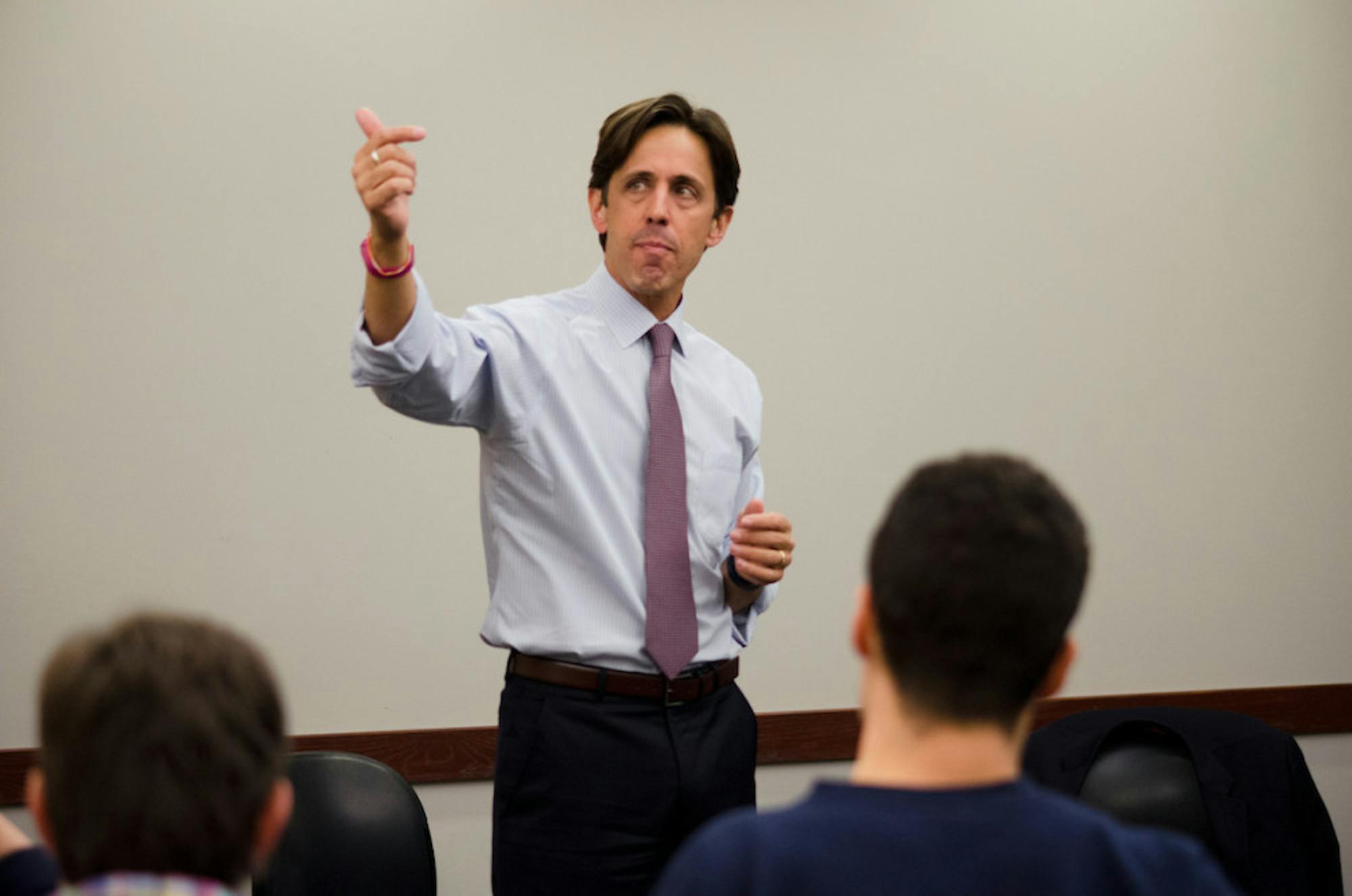David Simas, special assistant to President Barack Obama and director of the White House Office of Political Strategy and Outreach, spoke to a group of about 25 people in Dowling Hall yesterday during the last of the semester’s Civic Life Lunch events sponsored by the Jonathan M. Tisch College of Civic Life.
Dean of Tisch College Alan Solomont began the discussion by introducing Simon Rosenberg (LA '85), founder of the New Democrat Network and member of the Tisch College Board of Advisors, who is also a friend and colleagueof Simas. Rosenberg described Simas as a “rare creature” in Washington because of his ability to keep his colleagues grounded and remind them of the importance of public service when such work becomes particularly difficulty.
“In a town where no one has enough time, no one can return phone calls or emails, where people get blown off all the time and made to feel small because you’re in the big White House, [Simas has] done the exact opposite,” he said. “I mean, when you work with [Simas], you feel important, you feel big, you feel honored, you feel heard and listened to and it’s an incredibly rare skill … Barack Obama’s lucky to have him.”
After thanking Solomont for his service to the country and Rosenberg for his help and friendship, Simas reflected on the remaining 43 days of Obama’s presidency and all that had been accomplished over the previous eight years.
“There was a tremendous amount of fear and anxiety that people were justifiably feeling, and into the breach comes a senator from Illinois,” he said. “When I look back eight years later, by every single measure that we look at, the country is demonstrably better. And so when we leave on January 20, as the president said, with our backs straight and our heads held high, we will know that we did the job that we set out to do.”
Though Simas was pleased with the progress made by Obama and where he has taken the country, he expressed fears about the current political climate. He did not speak at length about the outcome of the election and President-elect Donald Trump but rather about his observations of a pervasive rejection of facts and increased personal and social stratification as products of political division.
“The way we talk about our politics and, frankly, the way we talk to each other is something I’m deeply concerned about and something that we’re going to be spending a great amount of time post-January 20 dealing with,” he said. “Civic engagement isn’t just an action to fill the day. It literally goes to whether or not a pluralistic democracy can function.”
Simas explained that some of the polarization was due to technology and social media allowing individuals to surround themselves with like-minded people and opinions and to rarely hear disagreements on their points of view. According to Simas, this has begun to jeopardize the idea of objectivity, which holds serious repercussions.
“There was a focus group I saw a couple of weeks ago where I was depressed. Not because of what people were saying about the candidates but because … they didn’t believe a thing about anything that they were hearing in the news. There were no facts. There was no truth ... and when nothing is true, everything is true,” he said.
According to Simas, election rhetoric has exacerbated these problems.
“The ability to see each other is becoming increasingly difficult ... People are beginning to say things like, ‘I don’t even understand how they believe what they believe.’ And once you have that level of abstraction where it’s not your neighbor or fellow American and it becomes ‘the other,’ then the coarseness of our politics goes into a cycle [where] frankly, given the way elections run, those fissures are deepened,” he said.
Simas repeatedly stressed personal connections and genuine listening as effective strategies to transcend the chasms that have grown between people on a social level as a result of political divisions.
In an interview with the Daily, Simas said that people increasingly define others purely based on whom they voted for or their political party rather than taking in the person as a whole. This comes along with a presumption of someone’s motives for voting one way or another, he said, which engenders polarization and a lack of empathy into how people approach politics.
“This is why listening, true listening, is so much more important, rather than simply dismissing someone as a Clinton voter or a Trump voter. The more important thing is the underlying ‘Why?’” he said.
He continued by saying that a university setting is ideal for different points of view to be expressed and explored but that this necessitates a determination to listen and understand a different perspective.
“It requires people to be able to withstand the voices of critique on the left or on the right and basically say, 'This is important, I’m going to do this, I’m going to listen.' It requires people, even though you believe deeply about something, for the purposes of the conversation... putting that ... aside,” he said. “That’s a hard thing to do, but I do believe once that begins it’s infectious.”
White House aide David Simas calls for engagement, empathy






